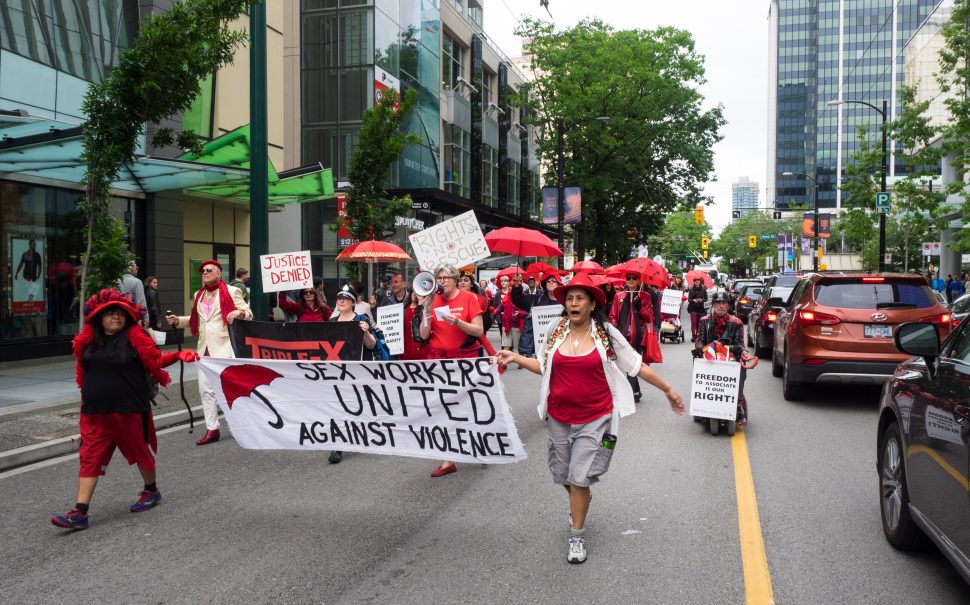Stigma around sex work is lessening across the UK, data from YouGov shows, but the hate Mancunian sex workers receive is far from over.
A 2024 YouGov survey indicates that 54% of Britons believe it should be legal to sell sex – while a 2008 Ipsos survey had a comparable figure of just 51%.
But the key difference is in people who previously felt negatively towards sex workers now perhaps ‘don’t know’ how they feel.
In 2008, 42% of Britons felt that it should be illegal to sell sex and only 5% didn’t know if it should be legal.
Whereas in 2024, 26% of Britons believed it should be illegal to sell sex and 30% didn’t know.
And while progress is slow the internet has enabled people who show their disdain towards this line of work to be even more direct with their hatred.
Online hate speech involving violent threats increased by 22% since the start of the pandemic, data from youth charity Ditch the Label shows, and this is having a direct impact on sex workers who work online.
British OnlyFans content creator Lauren Roland, was only harassed for her career once she decided to promote her content on social media.
She said: “People have called me everything from a pig to a dog.
“I am frequently compared to Princess Diana so I get a lot of hate on social media because of the fact that I look like her and do sex work.”

Who is responsible for hate towards sex workers?
Roland remarked that women can often be more negative towards her than men.
Data from YouGov supports this with women voting more negatively than men in every instance about their opinions towards sex workers.
Roland said: “It’s absolutely always women and not men that hate, the men are rarely judgemental and are rarely insulting towards me.
“They don’t have the same emotion involved as women, they don’t feel threatened as some women feel towards other women doing this kind of thing.”
Dr Chris Waugh, a lecturer and researcher in criminology and sociology at Manchester Metropolitan University argues this might because of a dichotomy in feminist argument that stems from the 1970s.
He said: “There is a compelling argument from the likes of Andrea Dworkin who argued that sex work is a form of sexual violence, and that no feminist should support sex work because it is a form of objectifying women.
“On the other hand, you have people like Gayle Rubin, who argued we should have a broader conversation about sex work in society and why it happens.”
Online hate in and Greater Manchester
Anne Smith*, a sex worker from Bolton, said that she had noticed generally less harassment in recent years – but a fear of online harassment has prevented her from making the same transition to virtual work as many others.
Smith said: “It’s one thing to work on the street and be shouted and screamed at there but I can leave that on the street.
“I don’t want to be harassed in my own home on social media for something I have to do.”
There are at least 3,000 sex workers in Greater Manchester and a reasonable estimate is 4,500.
Data from charity sex work organisation Manchester Action on Street Health (M.A.S.H.) in 2021 shows that 26% of sex workers they interviewed in Greater Manchester work in the city centre.
Bolton had the smallest amount of sex workers in the area with only 3% of sex workers across Greater Manchester working there.
Of the sex workers who worked in Greater Manchester, two-fifths report physical violence including rape, attempted rape, sexual assault and condom removal.
More than one-fifth of sex workers in Greater Manchester reported rape specifically; a quarter reported fraud and robber and a quarter reported stalking and harassment.
Online harassment was the the highest type of violence reported by sex workers in Greater Manchester with 57% reporting this.
Other forms of violence were also highly reported by sex workers in Greater Manchester such as sexual harassment (47%); sexual assault (46%); stalking (41%); the sharing of intimate images without consent (30%); and cyber-flashing (29%).
In a small independent survey conducted by Mancunian Matters, 76% of Mancunians interviewed said that there shouldn't be a stigma around sex work.
But the move to online sex work is something that a lot of sex workers had to consider over the Covid pandemic with restrictions on meeting clients in person made illegal and their own health to consider.
Smith continued: “I struggled a lot over Covid, I couldn't get out and work. I thought about doing OnlyFans content but to me it felt more personal.”
Dr Waugh pointed out, though, that online attitudes don't exist in isolation - they may translate to attitudes on the street as well.
He said: "Online anti-sex work discourse lays the groundwork for direct violence against sex workers.
"It's easy to say sticks and stones and that people online are always horrible but from a sociological perspective, the way we talk about an issue can shape the way we act."
Public opinion compared to what it used to be in the UK
The 2024 YouGov poll compared to the 2008 Ipsos poll also indicated that there was an increase of two percentage points in people who believed it should be legal to pay for sex.
The big difference was once again with those who previously voted it should be illegal to pay for sex as 43% believed it should be illegal in 2008 compared to 29% in 2024.
There was once again an increase in voters who 'didn't know' whether it should be illegal to pay for sex with 3% not knowing in 2008 compared to 30% in 2024.
Dr Waugh explained that this is because there is more exposure to the topic in media but also that there is more extreme pushback against the topic online as well.
He said: "I think sex work has had what we might call a kind of paradoxical mainstreaming. People in the media are talking about the trade in a less negative way.
"But at the same time, we are seeing a really intense pushback on social media which is characterised by deeply entrenched misogyny."
However public opinion on sex workers has undoubtedly shifted.
Roland explained: “When I was a child it was all very hush-hush, there wasn't the internet and it was all kept undercover.
“Anyone who did it would be really looked down on and judged.
“Whereas now some of these women are actually celebrated and considered minor celebrities.”
Public opinion on sex workers in Manchester
The YouGov data does not specifically cover Greater Manchester but rather breaks the data down into regions of the North, Midlands, London and the Rest of the South.
Data shows that the North is the only region in the UK where everybody either acknowledges the existence of stigma towards sex workers, or doesn't know: 0% of people said there was no stigma at all.
Manchester is known historically as a progressive city that subverts the mainstream ideas of what is considered acceptable.
The independent study shows that 81% of Mancunians who were interviewed were willing to be friends with a current or previous prostitute compared to nationally only 45% of people willing to be friends with a current or previous prostitute.
Currently, however, Northerners are more unwilling than willing to be friends with sex workers who create content online with 50% saying they would not have a friendship with a person who sells online sex content.
But 86% of those interviewed for the independent survey said they would be friends with an OnlyFans creator.
Why is public opinion of sex workers important?
Sex workers are some of the most vulnerable people in the UK and can often be exploited or physically assaulted due to the lack of protection in place for workers.
The only legal “managed” sex work area in the UK faced tragedy when Polish sex worker Daria Pionko, 21, was killed in the "managed red light area" by trucker Lewis Pierre, 24 in 2016.
The sex work area in Holbeck in Leeds was shut down in 2021 and so the UK remains without a legal sex work designated area.
The NPCC’s National Policing Sex Work Guidance noted that “the murder of sex workers continues to take place at an alarming rate”.
A total of 180 sex workers were murdered between 1990 and 2016 in the UK, according to research conducted by Stewart Cunningham.
It is estimated that in 2016 around 72,800 prostitutes were working in the UK.
More recently police in Scotland have come under criticism for the handling of the murder of prostitute Emma Caldwell.
Multiple sex workers came forward and accused Iain Packer of violent and controlling behaviour towards workers in attacks similar to what happened to Caldwell.
But police refused to take workers seriously in their statements and Packer escaped justice for 19 years.
What can be done to support sex workers?
Dr Waugh argued that whilst it is great that public opinion towards sex workers is becoming less negative, policy change is needed to adequately protect vulnerable people who enter the trade.
He said: "Policies around sex work in England and Wales are deeply contradictory and I would argue deeply harmful for sex workers."
This is because the right to buy and sell sex is legal in England and Wales but the advertisement of sex work is illegal.
The police can then hand out 'prostitute cautions' which do not need proof of criminal activity nor can they be appealed but remain on a person's record for 10 years, preventing them from getting work in other industries.
There is a push from progressive voices in communities to decriminalise sex work to remove the danger imposed by the criminalisation of the trade.
New Zealand has proved decriminalisation can work when in 2003 they did so with verifiable success.
Over 90% of sex workers said they had additional employment, legal, health and safety rights.
64.8% found it easier to refuse clients and 70% said they were more likely to report incidents of violence to the police, according to a report conducted by the University of Otago in New Zealand.
So decriminalisation can work to protect sex workers from violence they receive on the street - but in terms of changing public opinion, a reform on education may be needed.
Smith said: “I think there needs to be a better public understanding and respect towards sex workers, because they treat you like you're a criminal, you are literally treated like the scum of the earth.”
Is the UK heading in the right direction in terms of our opinion and treatment of sex workers?
Data may suggest that we are as a nation - but the likes of Dr Waugh, Anne Smith and Lauren Roland would all like to see more change take place.
*Anne Smith is a fake name as the sex worker wished to remain anonymous.
Featured image courtesy of Sally T. Buck on Flickr.




